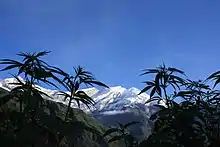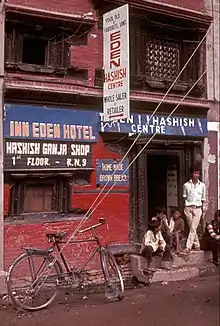Cannabis in Nepal
Cannabis in Nepal has been illegal since 1960, but the country has a long history of use of cannabis for Ayurvedic medicine, intoxicant and as a holy offering for Hindu god Shiva and continues to produce cannabis illicitly.

History

Nepal has used psychoactive cannabis for centuries, and as early as the 1700s Nepalese charas was recognized as the best available.[1]
In the early 1800s, commentator Francis Buchanan-Hamilton noted:
In Nepal, the Gangja, Charas, or Cannabis sativa, as I have already mentioned, is a common weed : but in that country it is not cultivated, although much used for the purposes of intoxication.[2]
The Hippie Trail
In the 1960s, the Hippie Trail began to route young Western adventurers through Nepal. The stable traditional cannabis economy was rocked by the influx of demand, and the heavy usage by visitors normalized and made cannabis consumption trendy locally. The increased demand and linkage to outside markets led to an increase in hashish production, and smuggling routes established through India and out to the wider world.[3]
Prohibition
In 1973, Nepal canceled the licenses of all cannabis shops, dealers, and farmers, under pressure from the United States and the international community. However, personal cultivation and use were unaffected, and cannabis commerce continued illicitly. The loss of $100,000 in government revenues caused disruption, and later in the 1970s, attempts were made at crop substitution.[1]
Cultivation
Cannabis can be found in the wild in all hilly areas of Nepal. There has been some report of illegal cultivation in the country.[4]
Usage
Pickles
In Nepal, cannabis seeds are also used in making pickles "bhang ko achar". The dried seeds are ground and then mixed with aalo (potato). This is common in a hilly area like Kathmandu, Pokhara of Nepal.
Medicine
It is used in the Ayurvedic medicine by Singha Durbar Vaidyakhana.
Festival
Cannabis is considered as the gift of Lord Shiva, and is considered as holy offering in the festival of Mahashivaratri. Because it's illegal, police make arrest around Shiva temple on this day every year.[5][6]
Legalization Movement
Member of Parliament from the Communist Party, Birodh Khatiwada, and 47 other party lawmakers filed a motion in parliament in January 2020 calling for the legalization of Cannabis. [7]
See also
References
- Martin Booth (30 September 2011). Cannabis: A History. Transworld. pp. 325–. ISBN 978-1-4090-8489-1.
- Francis Hamilton (1819). An Account of the Kingdom of Nepal: And of the Territories Annexed to this Dominion by the House of Gorkha. A. Constable. pp. 231–.
- Vera Rubin (1 January 1975). Cannabis and Culture. Walter de Gruyter. pp. 255–. ISBN 978-3-11-081206-0.
- Rubin, V. (2011). Cannabis and Culture. World Anthropology. De Gruyter. ISBN 978-3-11-081206-0.
- "Police to arrest cannabis users at Pashupati this Mahashivaratri festival". Retrieved 2020-06-17.
- "Thousands smoke cannabis at festival in Nepal". The Independent. 2020-02-21. Retrieved 2020-06-17.
- "Nepali lawmakers push marijuana legalization". Nikkei Asian Review. Retrieved 2020-06-17.